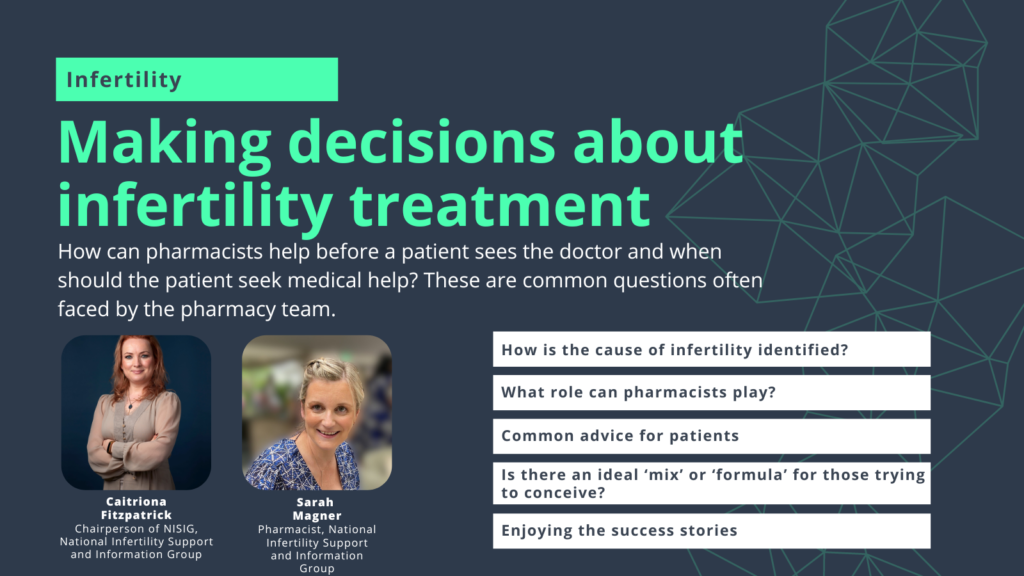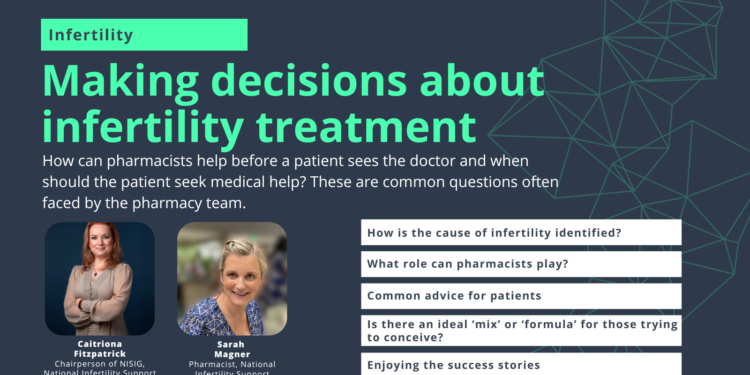Making decisions about infertility treatment – how can pharmacists help before a patient sees the doctor and when should the patient seek medical help? These are common questions often faced by the pharmacy team.
Written by
Caitriona Fitzpatrick, Chairperson of NISIG, National Infertility Support and Information Group

Sarah Magner, Pharmacist, National Infertility Support and Information Group

We recently spoke with Pharmacist Sarah Magner and Caitriona Fitzpatrick from the National Infertility Support and Information Group to gain further insight into the vital role played by community pharmacists and their teams in this field.
Infertility is often a lonely and solitary journey and the pharmacist is often one of the few people who are aware that the patient is experiencing infertility. Those under 35 and who have been trying for a baby for 12 months, or over 35 and trying for 6 months should have investigations initiated. This can start with blood tests of which many can be carried out by the patients’ own GP. These include testing for both partners.
Infertility is defined when couples are generally advised to seek medical help if they are unable to achieve pregnancy after a year of unprotected intercourse. Pharmacists are in an unique position to be able to offer advice in areas that can enhance fertility. Smoking cessation is a major service that can aid improved fertility. Smoking can contribute to infertility in both men and women.
Twelve percent of all infertility cases are a result of the woman either weighing too little or too much. It is possible for women with body weight disorders to reverse their infertility by attaining and maintaining a healthy weight. Pharmacists can offer advice and support in weight management. Pharmacists can actively intervene and play a key role in weight management. At the lower level of engagement, they can help patients in selecting an appropriate weight loss medication and counsel them about appropriate use of weight loss medications. At the higher level of engagement, pharmacists alone or in collaboration with doctors and dieticians can work with patients. In the provision of these services, the pharmacist could use point-of-care devices to check parameters such as blood glucose, blood pressure and cholesterol, review the patient health history, assess the patient’s readiness to change an undesirable health behaviour, offer motivational counselling, design a pharmacotherapeutic plan, and monitor the safety and efficacy of weight loss medications.
How is the cause of infertility identified?
Infertility affects men and women equally. Twenty-five percent of infertile couples have more than one factor that contributes to their infertility. In approximately 40 percent of infertile couples, the male partner is either the sole cause or a contributing cause of infertility. Irregular or abnormal ovulation accounts for approximately 25 percent of all female infertility problems. Often infertility issues may arise if the patient has irregular or absent periods, ejaculation issues, a diagnosis of PCOS or endometriosis, prior surgeries or any medical conditions that may complicate conception or pregnancy.
What role can pharmacists play?
As both a pharmacist and a patient who underwent treatment abroad the main issues as I see them are access to medications prescribed and an understanding of the dispensing requirements by pharmacists who may infrequently dispense fertility medications.
Prescription from other EU countries are legal and can be dispensed in Ireland without the need to get transcribed by an Irish doctor. High Tech medicines are also covered without the need for a High Tech prescription. This can be achieved by sending the original prescription from the clinic abroad along with a letter from the patients GP stating that they are aware that they are receiving infertility treatment abroad to the High Tech hub.
Often supplements are on the prescriptions and these are mostly covered on government schemes. If in doubt the pharmacist should contact PCRS and enquire.
One example is Co Q 10 supplement which is covered but only if certain brands are dispensed or a certain cost price is achieved. As a pharmacist who underwent fertility treatment, I can say that personal experience has given me a far greater understanding.
If I could offer one piece of advice to my colleagues, it is that infertility is a tough road and when a prescription is presented, take the patients number and research if the item is available on a particular scheme. Connections via whatapp links and pharmacist forums now gives us the ability to get information from our colleagues in a quick and timely manner. It is a resource that as a pharmacist may be under utilised.
The National Infertility Support and information Group
National Infertility Support and Information Group (NISIG) was founded 26 years and provides support to people around a wide range of fertility related issues including IVF, surrogacy, miscarriage and related issues. We offer support around 4 key pillars:
• Peer to peer support meetings both in person and online
• Resources for those going through their treatment and families afterwards including our newly published books and workshops
• Information for members of the public, a helpline and live webchat
• Advocacy and lobbying in relation to legislation and increasing political awareness NISIG are resolute in our mission that, as the national charity at the coalface of fertility issues, we want to see funding for IVF, IUI, TSI and ICSI treatments provided through the public health system. We believe this is crucial to providing equal opportunity to all those seeking to start a family and to bring Ireland into line with other European countries.
Common advice for patients
I would strongly suggest getting support. People can be very empathetic if they know and often a couple or person undergoing IVF treatment choose to keep their IVF journey to themselves. However support groups such as NISIG can be invaluable and it can be much easier to share your concerns with people who have been through or are going through the same as yourself. Peer support cannot be under rated.
Evaluate the treatments being offered to you. When going through IVF it is often easy to go down the route of alternative or unproven therapies. HFEA are the UK’s independent regulator of fertility treatment and research using human embryo’s. They are also the first statutory body of it’s type in the world. One feature of it’s website is a traffic-light rated list of add-ons which consists of three colours that indicate whether the evidence, in the form of high-quality RCTs, shows that a treatment add-on is effective at improving the chances of having a baby for someone undergoing fertility treatment.
Clinics may request many tests at very high prices in an already expensive process. Speak to your GP when starting out and you will often find that many test, especially blood tests can be requested by them. This can save both money and time in some circumstances.
Is there an ideal ‘mix’ or ‘formula’ for those trying to conceive?
If there was a formula then the process would be a lot easier. Each couple may have different reasons as to why they can’t conceive so unfortunately there is no one thing that works.
There are many suggested supplements and lifestyle inventions, some with little to no clinical evidence. As for progressing to treatment, this also comes in may ways and can range from IUI to medicated natural cycles to IVF, ICSI, TESI, donor egg, donor sperm, embryo adoption or surrogacy and that is just to touch on a few.
Enjoying the success stories
My favourite success story is my own I’m delighted to say! I have two beautiful little people in my life now, a daughter of 4 and a son who is 8 months. It is easy to look back with rose tinted glasses, but it was tough at the time. Both physically and mentally it takes its toll, and you can look back and gloss over it when you have success. I had seven transfers in order to have my two children and I probably was medicated in some way for three of the last five years in doing IVF treatments.
I was lucky to be a pharmacist as sourcing medication sometimes alone can be a struggle. However I learned that most items are covered but I needed to often confirm this with PCRS. Often a clinic will call or email last minute with a change to protocol and this opened my eyes to being a patient on the other side of the counter. Couples going through IVF are often not just our patients but our colleagues. It is important to remember that not all infertility stories end as luckily as mine did. I know how privileged I am to have two children and it is something I hope remains with me.
For more information about NISIG: www.NISIG.com Twitter and Instrgram @NISIG1 Instagram is @nisig_ireland Email contact@nisig.com











